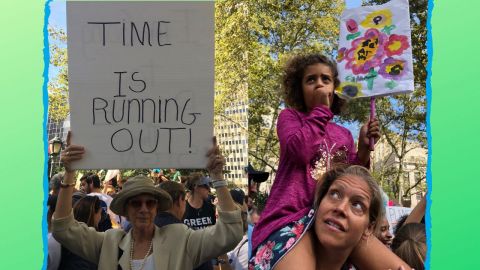We’ve known about the greenhouse effect for nearly 200 years and about global warming for more than a century, but we’ve had a hard time acting because our brains aren’t a good match for a problem this big.
Have you ever wondered why you live
on a beautiful blue watery planet
and not a frozen ball of ice?
That's exactly what the French scientist Joseph Fourier
wondered almost 200 years ago.
He calculated Earth was far enough away from the sun
that it should be much colder--
way colder, like below freezing, instead
of warm and comfortable.
Fourier noted that while sunlight
can shine through thegaps in Earth's atmosphere
to warm the surface, theheat our planet gives off
doesn't pass so easily backinto space, just like how
sunlight warms up a greenhouse.
Fourier's simple observation came
to be known as the greenhouse effect,
and gave birth to a new wayof thinking about the world,
the science of Earth's climate.
In the 200 years since,we've made a lot of progress
in figuring out how Earth's climate works,
how it's changing, and why.
But why have we had such a hardtime acting on that knowledge?
At the start, there wasjust a lot we didn't know.
But the next big eurekamoment came in the 1850s.
Scientists Eunice Foote and John Tyndall
figured out that adding more of certain types of gas,
like carbon dioxide, to Earth's atmosphere
would make it trap more heat.
And in the 1890s, Swedishscientist Swante Arrhenius
made the first mathematical predictions
of how much that extra carbondioxide would heat the earth.
But most people simply hadn't heard about any of this.
And if they had they might not have believed it,
since few people even imagined that humans
could affect something as big as the climate.
But Earth's human populationsoon took a steep upward turn,
partly because fossil fuels weretransforming the way we lived.
A British engineer named Guy Calendar
suspected this might have a bigger
impact than people thought.
In 1938, he looked atatmospheric and temperature
data from around the world in more detail
than anyone ever had.
He showed for the first timethat not only was burning
fossil fuels increasing the amount of CO2
in the atmosphere, butEarth's average temperature
was rising in response, justlike Arrhenius said it would.
A growing number of scientists realized
we were performing an unprecedented experiment
with an uncertain outcome.
They eventually gave it a name, global warming.
More measurements of the atmosphere
continue to tell the same story.
We were adding carbon dioxideto Earth's insulating layer.
That warmed the air, but wediscovered that it was also
changing the amount of ice at the poles,
the patterns of rainfall on land,
and even the chemistry of the ocean itself.
So we gave it a new name, climate change.
What's more, by analyzingancient air bubbles trapped
in ice millennia ago, we realized
that CO2 has been the maincontrol knob on Earth's climate
for hundreds of thousands of years.
Looking at the history, it's clear by the second half
of the 20th century, weunderstood the main causes
of climate change.
And they were surprisingly simple.
We knew what was happening and why.
So why didn't we do anything about it then?
Could it be that we just didn't want to know?
It's not like scientistswere keeping this knowledge
to themselves.
In 1959, physicist Edward Teller stood
in front of every major oil executive
and cautioned that by burning fossil fuels,
we were changing Earth's climate.
[audience booing]
In 1965, scientists warnedUS President Lyndon Johnson
about risks from climate change.
But it took until 1992 for usto sign a global treaty calling
for lower emissions.
And we're still struggling to act today.
That's partly because climate change
is a big, complicated problem,maybe the biggest humanity's
ever faced.
The modern world wasbuilt on and still depends
on fossil fuel energy, at least for now.
So adapting to and stopping climate change
will require revolutionizing much of how we live.
That would be really tough to do.
And it's difficult to even getour heads around what it might
look like, which brings us to another big reason
we find it difficult to act--
our brains are just bad at processing a problem
like climate change.
I mean, the gas that causesit is literally invisible.
And the changes play out over decades
across the entire planet.
When we do think about it, it can easily
feel far away or even overwhelming.
We know what's happening, andwe've known it for a long time.
Climate change will affect usall, no matter where we are
or how we live.
Solving it can't wait for tomorrow.
And we can't wait for otherpeople to solve it for us.
And that's why we're making this show,
to talk about how the climate is changing
and how we can make earth cool again.
Let's get startedcleaning up this hot mess.

























